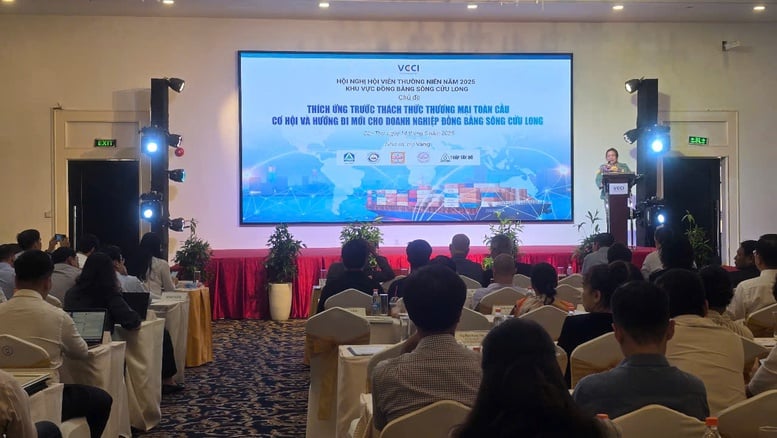
Businesses in the Mekong Delta region request consultation and policy recommendations to improve business conditions - Photo: VGP/LS
Many difficulties, challenges…
Speaking at the conference, Mr. Vo Tan Thanh, Vice President of VCCI, stated: In 2024, the economy of the Mekong Delta region will continue to grow positively, largely thanks to the continuous efforts of businesses in the region. The GRDP of the whole region will reach 7.3%, exceeding the growth rate of 6.6% in 2023 and higher than the national average of 7.1%. Many provinces have impressive growth rates, such as Tra Vinh (10%), Hau Giang (8.76%), Long An (8.3%), Kien Giang (7.5%).
The economic structure of the region is still characterized by a large proportion of agriculture - forestry - fishery (30.8%), services (37.5%), and industry - construction (27.3%).
In particular, import and export continue to be an important growth driver with total import and export turnover in 2024 reaching 41.9 billion USD (up 17.45% compared to 2023). Of which, exports will reach 28.19 billion USD (up 15.6%), imports will reach 13.76 billion USD (up 21.3% compared to 2023). Provinces with high trade surplus include Tien Giang, Long An, Dong Thap, and Can Tho.
The Mekong Delta region contributes up to 57% of the total surplus value from international trade to the national budget.
However, Mr. Vo Tan Thanh also pointed out the difficulties that many businesses in the region are still struggling with. That is, attracting foreign direct investment (FDI) is still modest in both the number of projects and scale. In 2024, the whole region will only attract 142 new FDI projects, with a total registered capital of 628 million USD, equal to 4.2% of the country.
In addition, the Vice President of VCCI also pointed out that the business community in the region still faces many difficulties. Although the number of newly established enterprises increased by 12%, it was only equal to 8% of the total number nationwide, and registered capital accounted for only 6.7% nationwide.
According to a survey by VCCI in the Mekong Delta region, most businesses forecast that they will face many challenges, such as: 68.8% of businesses are concerned about inflation and increased production costs; 57.1% of businesses forecast a decrease in domestic consumption demand; 54.5% of businesses believe that the export market will decline.
"These figures are a serious warning, requiring us, and both the public and private sectors, to take quick, drastic and coordinated actions to support businesses to overcome difficulties," said Mr. Thanh.
Mr. Nguyen Thuc Hien, Vice Chairman of Can Tho City People's Committee emphasized: In the context of complicated and unpredictable developments in the world situation, escalating trade tensions have affected import and export activities of countries around the world, causing the risk of disruption of production and supply chains.
Natural disasters, epidemics, climate change, risks to food security, energy security, and cyber security are increasing.
Faced with that situation, the provinces in the Mekong Delta region have closely followed the direction of the Government and the Prime Minister, making efforts to carry out tasks and solutions to achieve the country's overall growth target of 8% or more.
In the first 4 months of 2025, the Mekong Delta region had 4,981 new enterprises entering the market, accounting for 9.6% of the total newly registered enterprises in the country, with a total registered capital of VND 39,575 billion, attracting and creating jobs for more than 30,000 workers.
Deputy Director of VCCI Mekong Delta Branch Nguyen Thi Thuong Linh predicted the challenges in 2025 of VCCI Mekong Delta region when surveying from enterprises showed difficulties, such as inflation and increased production costs, declining domestic consumption demand, decreasing international market demand, more severe impacts of climate change, more difficult access to land and finding business locations, poor traffic quality affecting transportation costs and quality of goods, drought or flooding affecting raw material areas...
These issues pose major challenges to businesses, such as tariffs, exchange rate fluctuations, high international logistics and transportation costs, non-tariff barriers, legal regulations, technical barriers of import markets, lack of market information and political fluctuations that influence customer decisions.
Therefore, according to VCCI, many businesses in the Mekong Delta region requested to be consulted and proposed policies to improve business conditions, provide information on legal policies, update the business environment, organize seminars to recommend policies, and enhance business capacity for businesses through training and consulting...
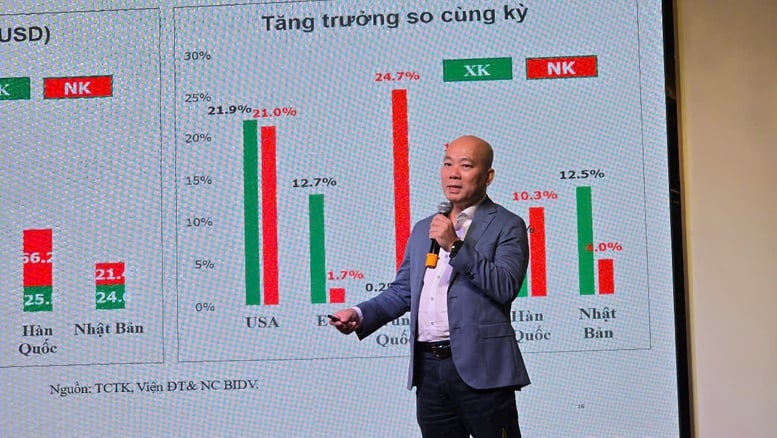
Director of the Trade Promotion Agency, Mr. Vu Ba Phu, spoke at the conference - Photo: VGP/LS
Need to shape business strategy in the new context
Referring to the shaping of new business strategies for Vietnamese enterprises in the face of the global trade war, Mr. Vu Ba Phu, Director of the Trade Promotion Agency (Ministry of Industry and Trade) stated: The world's supply chain has been shifting to the US, Europe, India... Therefore, we build separate strategies for each of the above regions to effectively approach the market.
In addition, Vietnamese enterprises need to review what advantages and incentives they have taken advantage of from the free trade agreements (FTAs) that Vietnam has signed with other countries. How to access the 2,000 billion USD Halal market of Muslim countries, as well as pay attention to the very practical requirement of green conversion when exporting to countries such as the European Union.
At the same time, we need to pay attention to the domestic market, avoiding the situation where export goods are better than domestically consumed goods.
Faced with the US's move to impose high tariffs, Mr. Phu raised the issue: We must seriously consider the challenges and disadvantages to improve the competitiveness and ability to withstand shocks of the world economy.
Referring to the impact of US tariff policies on businesses in the Mekong Delta in particular, especially seafood exporting businesses, economist Nguyen Xuan Thanh (Fulbright School of Public Policy and Management) said that the challenge for businesses in the Mekong Delta is that some US politicians are demanding high tariffs on Vietnamese agricultural and seafood products to protect their country's products. Therefore, along with the Government's efforts in negotiating with the US, businesses need to proactively improve product quality, diversify inputs, and "shift" to find more export markets to relieve tariff pressure from the US.
Le Son
Source: https://baochinhphu.vn/doanh-nghiep-dbscl-dinh-hinh-chien-luoc-kinh-doanh-trong-boi-canh-moi-102250514191523822.htm






![[Photo] Prime Minister Pham Minh Chinh chairs conference on anti-smuggling, trade fraud, and counterfeit goods](https://vphoto.vietnam.vn/thumb/1200x675/vietnam/resource/IMAGE/2025/5/14/6cd67667e99e4248b7d4f587fd21e37c)














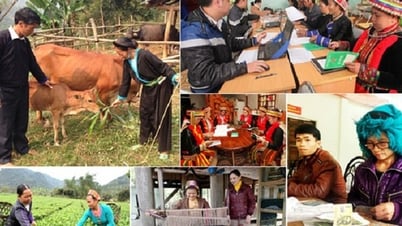
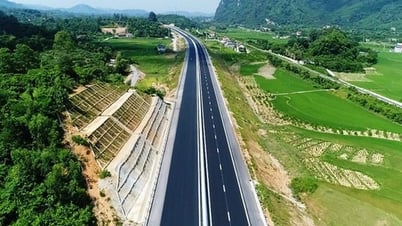


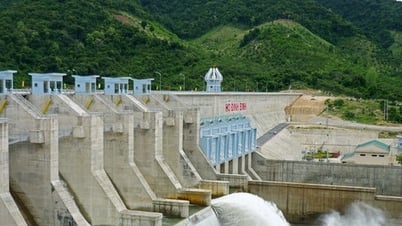
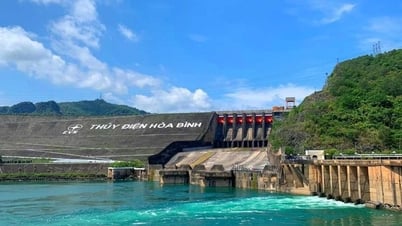




































































Comment (0)